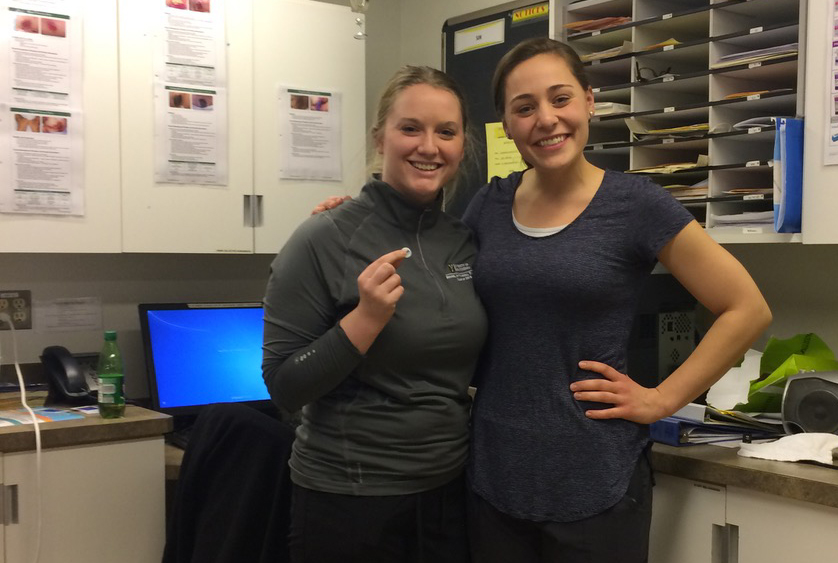
Innovative ACU's making a difference
Accountable Care Units: Offering improved patient care and unique opportunities for student learning
Patients with complex care needs are receiving more timely and effective care in an innovative new way to structure hospital wards, called Accountable Care Units (ACU). It is a system of care in which interdisciplinary health care providers and patients are better connected with improved communication and responsibility to ensure that patients receive the safest and highest quality of care possible.
On Accountable Care Units, the physician, nurse and allied health care professionals perform Structured Interdisciplinary Bedside Rounds (SIBR) with the patient. Family members and caregivers are welcome to attend SIBR at the discretion of the patient. SIBR occurs at a consistent time, 7 days a week, 365 days a year in order discuss the individualized care plan of the patient, recognize potential acute care discharge barriers and for discharge planning. Specific language is utilized by each care provider to ensure clear, concise communication at bedside.
With such consistent, co-ordinated processes and communication, patients have been found to have an improved care experience, are returning to community sooner, and the work environment is more fulfilling for health care providers.
Dr. Jason Stein is the physician founder and CEO of 1Unit - he initiated the ACU movement in Regina as a pilot project and it continues to grow. There are now five ACUs in Saskatchewan.
“We’ve been perfecting the ACU care model in U.S., Australian, and Canadian hospitals since 2010," Stein explained. "The response by patients and medical, nursing, and allied health staff is consistent. It turns out, we all seem to thrive in this high-communication environment. It’s the ideal way to deliver care and it’s the ideal way to train our students.”
As part of the ACU, student learners are welcomed into the interdisciplinary health care team. Jillian Eberts, a second year University of Saskatchewan Master of Physical Therapy student was involved in the ACU at Pasqua Hospital in Regina. When Eberts exhibited excellent clinical and communication skills, her Clinical Instructor, Alana Morrissette (MPT from University of Manitoba) encouraged her to pursue training beyond the requirements of a typical clinical placement. Eberts welcomed this opportunity and successfully completed the ACU training. Eberts also became the first physiotherapy student in Canada to become SIBR certified by exhibiting specific, standardized high performance behaviours at the bedside. This competency verification included the completion of online modules and in person practical performance behaviours.
Dr. Ron Taylor, co-lead of Canada’s first ACU, has engaged allied health care professionals in pursuing ACU training and attending SIBR. With his guidance, Morrissette was Canada’s first SIBR certified physical therapist and has been ground-breaking in creating the SIBR template that is used for the best Physical Therapy practices on the unit - she is also the first Physical Therapist to be able to certify others in the training. Morrissette has noticed increased staff engagement in mobilizing patients, more appropriate therapy consults, and fewer barriers to therapy intervention. Having a social worker and pharmacist present during SIBR also allows for thorough discharge planning.
“ACUs demonstrate how health care should be provided, consistent communication between colleagues, availability of physician, and daily communication between the team and the patient to address goals of care and potential discharge barriers," Morrissette said, giving Stein credit for the work. "He has been a wonderful support in identifying specific language to be used during SIBR, and with the general engagement of Physical Therapists on ACUs."
Many partnerships exist in health care in order to provide patient care, this is an example of the very best, between University of Saskatchewan, Saskatchewan Health Authority, and the interprofessional work within those organizations.
“With so many hospital units implementing the ACU care model," Steing continues. "Saskatchewan is literally becoming a destination for team-oriented trainees who want to learn and clinicians who want to practice in the hospital of the future.”
This article was submitted by:
Cathy Cuddington BScPT
Dr. Jason Stein MD, SFHM. Dr. Stein noted his job description is hospitalist, and he is the Chief Executive Officer for the 1Unit.
Alana Morrisette, BSc, MPT
